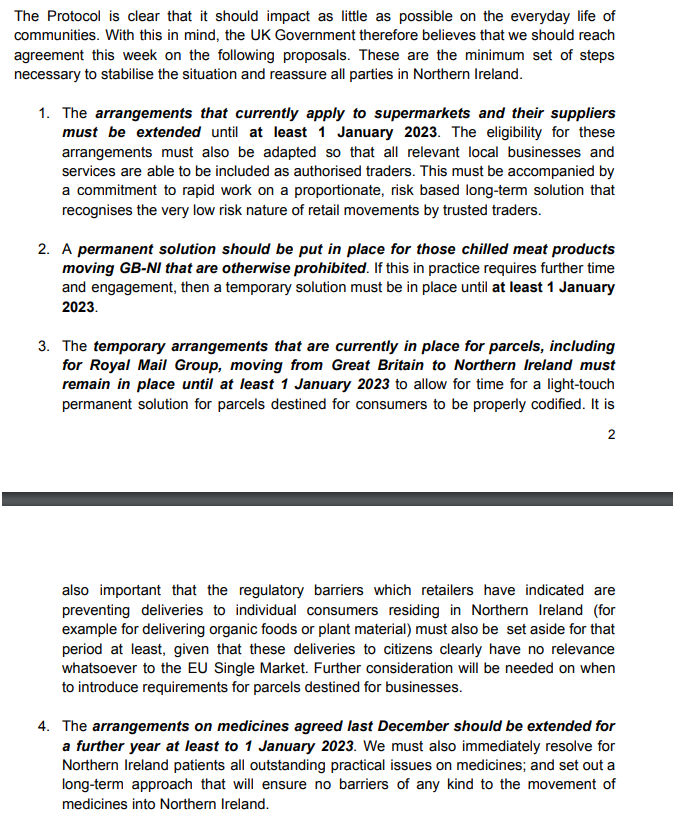
Thinking again about the UK's European policy and why it doesn't work
tl;dr EU doesn't think UK has a credible alternative to making things work in long-run
1/
tl;dr EU doesn't think UK has a credible alternative to making things work in long-run
1/
To recap, since Johnson's entry to No.10, UK has not only picked at the scabs of the Brexit process, but has actively sought out points of conflict and tension
IMB; non-implementation; unilateral delays; EU Ambo status; EU office in NI; etc; etc
2/
IMB; non-implementation; unilateral delays; EU Ambo status; EU office in NI; etc; etc
2/
Today's announcement about EU starting dispute proceedings against UK is unsurprising, in the context, and much more likely to result in UK giving way than the EU
3/
3/
And this has been the pattern: UK action, followed by more UK action to back-peddle
Hasn't been a single case where UK has successfully forced EU to accept new situation
[last week's extension of non-enforcements was not w/in WA/TCA framework BTW:
4/
Hasn't been a single case where UK has successfully forced EU to accept new situation
[last week's extension of non-enforcements was not w/in WA/TCA framework BTW:
https://twitter.com/Usherwood/status/1370064429866479630?s=20]
4/
We'll park the 'why?' of British policy elsewhere: maybe it's a way to keep the EU as a scapegoat (@rafaelbehr), or because UK hasn't realised it's a 3rd country (@APHClarkson)
But let's focus on the 'how?' for now
5/
But let's focus on the 'how?' for now
5/
As I discussed a couple of years ago, UK isn't able to do a convincing 'madman' approach to the EU
6/
https://twitter.com/Usherwood/status/1035065648668450816?s=20
6/
Key point of that thread was that you need opponents to think BOTH that you're unhinged AND that you could do something terrible
First part might be there (given evident bizarreness of many actions in recent months), but second certainly isn't
7/
First part might be there (given evident bizarreness of many actions in recent months), but second certainly isn't
7/
Which makes you less a madman than Violet Elizabeth Bott
(this probably tells you enough about her for now: en.wikipedia.org/wiki/Just_Will…)
8/
(this probably tells you enough about her for now: en.wikipedia.org/wiki/Just_Will…)
https://twitter.com/Usherwood/status/1035069042757980160?s=20
8/
From EU's perspective, UK has signed up to 2 legally-binding treaties that underpin current relationship, plus UK has host of other international treaty obligations (e.g. WTO, GFA, etc.), plus it's economically exposed to EU
9/
9/
If UK doesn't seem to have a credible alternative to its situation, then that implies it needs to live with its situation, which EU will take as a powerful corrective/constraint on UK action
10/
10/
Yes, long-term economic entanglement can be reduced, and UK trade redirected, but not in any hurry
But geopolitical situation is pretty permanent (even an improving Russia would be offset by waning US interest in region)
And as for undermining international treaties?
11/
But geopolitical situation is pretty permanent (even an improving Russia would be offset by waning US interest in region)
And as for undermining international treaties?
11/
However, none of this changes that UK is continuing on this course, despite evident costs to international credibility, business certainty and anything in coming period that UK might need EU help with
12/
12/
EU will continue to use the tools it has to hand to protect the treaties it holds with UK and UK is likely to find those tools force it either to retreat to status quo ante or to escalate further (despite all the things we've just discussed)
13/
13/
If you're looking for a way out of this, then there are only two that look vaguely likely
1) Johnson changes approach (because it's too costly)
2) you get a new administration in No.10 (again, to change UK approach)
Neither look as if they're on the cards right now
14/
1) Johnson changes approach (because it's too costly)
2) you get a new administration in No.10 (again, to change UK approach)
Neither look as if they're on the cards right now
14/
In sum, we've got a lot more of this
And longer it goes on, harder it will be to rebuild a stable relationship (of any kind) with EU
/end
And longer it goes on, harder it will be to rebuild a stable relationship (of any kind) with EU
/end
• • •
Missing some Tweet in this thread? You can try to
force a refresh








